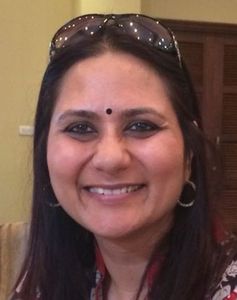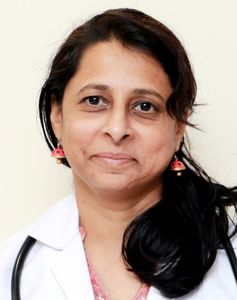When Anamika Gupta was 38 weeks pregnant last year, she went for a scan. Her gynaecologist told her that they would not be able to go ahead with a normal delivery as the umbilical cord was found wrapped around the baby's neck. The doctor suggested a C-section as per a date and time convenient to Gupta but she was unconvinced. Three years earlier, she had undergone a C-section for first born, Kairav, because of the same reason. This time, she was determined to have a VBAC (vaginal birth after Caesarean). In her 40th week, just in the nick of time, she approached another obstetrician at Sitaram Bhartia hospital in Faridabad, who helped her birth her second son, Kaveer, vaginally with a healthy weight of three kilos. "The reason I was not ready to accept a C-section was that the cord was not wrapped tightly around my baby's neck and there seemed to be no emergency," says Gupta. "Yes, my diagnosis of gestational diabetes did pose a threat but I was well aware that I could still have a normal delivery." Her awareness was the result of a number of workshops she attended during her pregnancy, which helped her understand her own physiology better.
In the last four years, the process of pregnancy and birthing has undergone a transformation, wherein the mother now wants to lead from the front, says Dr Rajeshwari Pawar, a gynaecologist at Motherhood Hospital, Pune. "She is no longer ready to remain in the backseat and let the doctors dictate terms. Leaving aside the medical expertise, everything else is now in the control of the mother," says Pawar. And, putting her in the driver's seat are a number of service providers—from hospitals and doctors to counsellors, doulas, birth centres that insist on natural birthing and, more important, midwives. "It is the concept that pregnancy is a natural body process that must be accompanied with minimum medical intervention that is at play here. But these can supplement medical expertise at best, not replace it altogether, especially in case of high-risk pregnancies," says Pawar.
Vijaya Krishnan, who runs a natural birthing centre called The Sanctum in Hyderabad, agrees. The centre is predominantly led by midwives who emphasise on natural birth (vaginal birth with minimal medical intervention) and provide preconception counselling, antenatal checkups, water birth, VBAC and lactation support. "Women's bodies are tuned to give birth to their babies on their own without unnecessary medical interventions," says Krishnan. "We lay emphasis on birthing outside of hospitals and on the role of the midwife as they can be most effective, outside of obstetric-centric environments. Therefore, autonomous or independent midwives have been most successful in achieving best outcomes in maternal health and in natural births."
The government, too, is encouraging the role of midwives. In February, the ministry of health and family welfare announced guidelines on midwifery services at a World Health Organization-led global forum for maternal, newborn and child health in Delhi. "Approximately 85 per cent of pregnancies and births do not require specialised obstetric intervention," said Jagat Prakash Nadda, then minister of health and family welfare, in December 2018. "Midwifery-led care can play a critical role in promoting physiological births and reducing over-medicalisation. Not only can a strong midwifery cadre provide quality childbirth care to our mothers and newborns, it can also ensure care with dignity and compassion."
Says Dr Sarla Shah, a family physician in Mumbai: "A midwife essentially helps in carrying out normal deliveries. In hospitals, too, they have midwives in the form of well-trained nurses who are equipped to help carry out a normal, risk-free delivery and also provide pre-and post-pregnancy care. Then, there are also doulas, whom the couple can hire, for a more intimate counselling-based support."
Towards her seventh month, Gupta says she felt more in-charge of herself after she began attending workshops by Neha Misra Mutluru, a professional birth doula and a Lamaze-certified childbirth educator. "I was counselled on everything, be it my diet and exercises, or how to keep my hospital bag, making a birth plan, building a mood in the hospital room with the help of music, incense sticks and a prayer altar, and actually breastfeeding my child the very first time," says Gupta. Mutluru was with Gupta in the hospital's labour room, too, providing moral support.
Aruna Yellampalli, a software tester with an MNC in Hyderabad, had her first child at 26 via C-section and a natural birth thereafter for her younger one. She believes that the presence of a doula and a midwife during her second delivery made her feel "supported, well cared for and happy". "I realised that the doctor is one part of the story and largely one who is a risk-identifier," says Yellampalli. "But for motherhood being a journey of happiness, it is the women around you who make you feel comforted and cared for, which is most crucial and valuable during pregnancy and childbirth. I would advise more women to opt for a midwife-assisted birth, be it in the hospital or at the birth centre."
However, Dr Sonal Kumta, consultant, obstetrics and gynaecology, Fortis hospital in Mumbai, says it will take some time before millennial mothers in urban cities are ready to accept the midwifery-based care model for childbirth. "The number of expecting women with lifestyle disease and complications is only rising by the day. Hence, the role of the doctor is inevitable, except for normal, risk-free deliveries. Also, the problem is that in private practice in India, pregnant mothers still do not accept the midwife delivering the child. And even if they do, we do not have trained midwives," says Kumta.
Telangana became the first Indian state to help bring in a new cadre of certified midwives to improve maternal and infant health care. It was a pilot programme in 2017, and in November 2018 the first batch of professionally trained midwives graduated. Vijaylaxmi, a nursing superintendent with a masters in nursing with specialisation in obstetrics and gynaecology, says her hospital, too, provides midwife-based care where necessary. "A midwife today has to be more than her area of expertise, which is delivering babies through normal delivery. With changing times, the earlier qualification of an ANM (auxiliary nurse and midwife) has now been disregarded in many hospitals, which are now demanding domain expertise."
Be it in a hospital or a birth centre, it is the continuity of care which is the hallmark of midwifery. Women who have experienced medically-managed childbirth often complain that they met several people during the course of their care. "Having to repeat herself time after time, to a new person involved in her care can take away from the meaningfulness of the birth experience," says Priyanka Idicula, who runs a natural birth centre in Kochi. "A number of studies show that women attended to by midwives need fewer epidurals, and were less likely to have Caesarean births. Also, where midwives are the main providers of care, women are less likely to give birth prematurely."
Hospitals are also upping their game by bringing in innovative ways of making the mother-to-be comfortable. At Hiranandani Hospital in Vashi, Mamma Mia is a dedicated centre for expecting mothers. A number of tailor-made treatments such as massages, reflexology and breathing techniques help alleviate physical discomforts such as morning sickness, backaches, water retention and fatigue. Birth preparation classes are held, along with tutoring of fathers-to-be on the many ways they can care for a pregnant wife and thereafter for a new mother.




